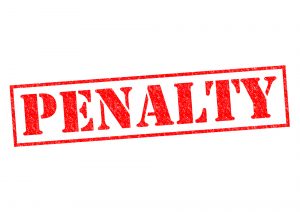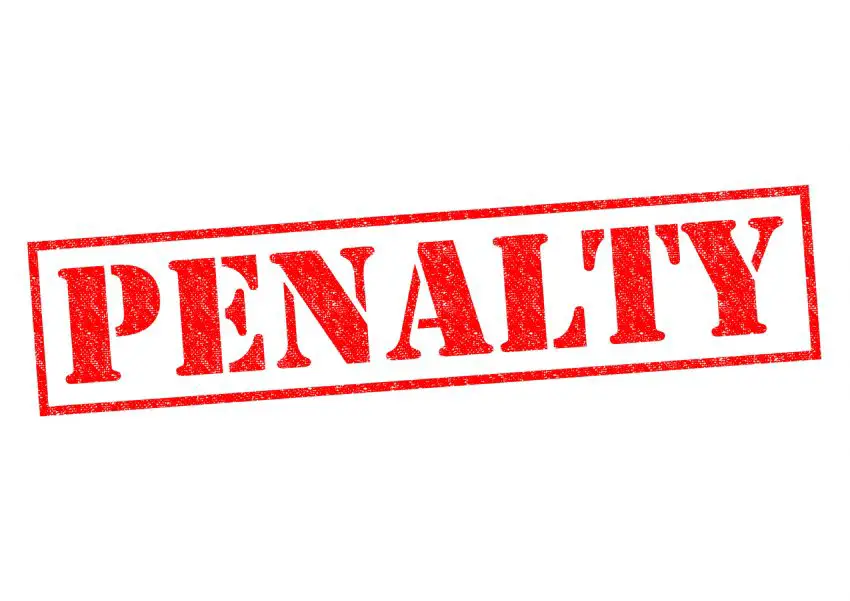Do you know when Tax Day is? Its important to know the key tax filing dates. Typically Taxes are due on April 15th and Oct 15th if you take an extension. Do you know What Happens if You Miss the Tax Deadline? Keep reading to learn everything you need to know about penalties related to missing the tax deadline.
The most important thing to know is the sooner you act, the less you’ll need to pay in fees and penalties to the IRS.

Contents
IRS Penalties for Filing a Late Tax Return
If you don’t file your tax return or apply for an extension by April 18, you may face financial penalties from the Internal Revenue Service (IRS).
There are two main penalties. The first is the late-filing penalty (failure-to-file penalty). The second is the late-payment penalty.
While similar, they aren’t the same. Typically, the penalties for filing late or not filing are higher than those for not paying your owed taxes.
The late-filing penalty applies to people who don’t file their Form 1040 and other tax documents on time.
Usually, the penalty is 5% of your overdue taxes each month your tax return is late. However, this penalty will not exceed 25%, so the penalty lasts for five months.
If your tax return is more than 60 days late, the minimum penalty is the smaller amount between $435 and the unpaid taxes you owe.
Conversely, the late-payment penalty applies to people who pay their taxes late. The fine is 0.5% of your unpaid taxes for each month you don’t pay. This penalty also will not exceed 25%.
Yet, if you have a reasonable cause for filing late, you may not need to pay any penalties. Though, you will still need to pay interest. The interest rate is the same as the federal short-term rate, plus 3%.
Reasonable Cause Penalty Relief
The IRS will take several reasons into account if you fail to file your tax return, make a deposit, or pay taxes on time. Some sound reasons include:
- Inability to obtain records
- Fire
- Natural Disaster
- Casualty
- Death, serious illness, incapacitation, or unavoidable absence of yourself or an immediate family member
- Other reasons where you couldn’t meet your tax responsibility even after using all ordinary business care and prudence
The IRS gives some people an automatic extension. For instance, those who are victims of a natural disaster, members of the military, or living overseas may automatically get more time to file their taxes.
An example of an automatic extension occurred last year. The IRS extended the 2020 tax year federal filing date from April 15, 2021, to May 17, 2021, for all individuals because of the COVID-19 pandemic.
Additionally, those in Illinois, Kentucky, and Tennessee that faced tornadoes in December 2021 received an automatic extension.
When you file your tax return, you must attach a statement explaining your reason for filing late. Include any supporting documents to strengthen your case, such as:
- Hospitalization records
- Letter from a physician
- Insurance claims
The IRS will review your case and determine if you need to pay any penalties or not.
A lack of funds is not a reasonable explanation to file or pay late. But, the reasons for the lack of funds may meet the reasonable cause criteria for the failure-to-pay penalty.

How To Avoid a Penalty
If you know you cannot file your taxes by April 18, file an extension as soon as possible. The extension gives you until October 15, 2022, to file your 2021 tax return.
As mentioned, the deadline to file for an extension is the same day your tax return is due (April 18, 2022). If you miss this deadline, the failure-to-file penalty will lead to financial penalties.
But remember, the extension only gives you more time to file your taxes, not pay your taxes. So if you owe taxes, estimate how much you owe and send a payment.
If you overpay the IRS, you will get a refund when you file your tax return. It’s better to overestimate rather than underestimate how much you owe to avoid penalties and interest.
What To Do If You Cannot Pay
The government expects you to pay at least 90% of the taxes you owe by Tax Day. You can use IRS Direct Pay to make a payment.
If you cannot afford your tax bill, it is much better to file a tax return or extension and pay what you can rather than not filing at all. Not filing will result in even higher fines.
Then, you can find alternative methods like a credit card or loan to make the payment. The interest these options offer may be lower than the penalties you’ll face. The IRS also allows you to apply for a payment plan or installment agreement through Direct Pay.
The IRS offers several different payment plan options you can apply for.
No matter which option you choose, keep in mind that you’ll likely need to pay taxes again for your 2022 filing next year. So try to pay off all your 2021 tax bill as soon as possible so you can start saving for your 2022 bill.
Filing for an Extension
You need to fill out Form 4868, Application for Automatic Extension of Time to File U.S. Individual Income Tax Return to file an extension. The form is free to file.
You can fill out the form on paper or electronically. You need to provide your identification and individual income tax information. This includes your:
- Name
- Address
- Social Security number
- Spouse’s Social Security number
- Tax liability estimate
- Payments already made
- Balance due
- Amount paying
If you file online, you will receive an email of the extension, which you should keep for your records.
Those with an adjusted gross income (AGI) below a specific amount can use File Free to prepare their taxes. It’s a free service from the IRS. The income threshold for 2021 is $73,000.
Those above the threshold can still use the Fillable Forms tool on the IRS’s website for assistance.
When the Penalties Don’t Apply
If you miss the deadline but the government owes you a refund, you won’t face a failure-to-file penalty. The government will gladly hold onto your money a little longer. In fact, you have up to three years from the filing deadline to complete your tax return and get the refund.
However, the government keeps this money interest-free, so it’s best to claim the money as soon as possible. You can make that money work for you in much better ways.
Further, if you get a Premium Tax Credit to pay for insurance, not filing your return could jeopardize that credit.
State Taxes
Even if you don’t face federal penalties because the IRS owes you a tax refund, you need to check your home state’s tax code for further penalties.
Some states penalize late filers regardless of if they owe money or not. Therefore, it is always best to double-check your state’s penalties before deciding whether you will file a tax return or not.
Long Term Consequences of Not Filing a Tax Return
Technically, you can only face a criminal tax evasion charge within six years. But, there is no limit on collecting the taxes and penalties you owe.
There may be other consequences to not filing as well.
For instance, if the IRS can use the information available to estimate your taxes, they may file your tax return. This is especially true for W-2 employees.
If the IRS does this, they won’t take into consideration:
- Deductions
- Tax credits
- Tax breaks
You can also lose money that the IRS owes you. For example, if you didn’t file or pay your 2020 taxes but were owed a tax refund in 2019, you may lose that refund. You still have until April 15, 2023, to claim a 2019 tax refund.
If you don’t claim it, the IRS can take the money for not filing or paying your 2020 taxes. They may not take it before the deadline, but it’s a risk you’re taking.
Additionally, as discussed, the late-payment penalty is 0.5%. But this rate will go up to 1% ten days after you receive a final notice of intent to levy from the IRS.
A tax levy is a legal seizure of property to fulfill an unpaid debt. Failure to pay your taxes could result in the IRS levying your property. The IRS can also levy other assets like:
- Bank accounts
- Rental income
- Retirement accounts
- Cash
- Cars
- Tax refunds
- Future wages
The IRS does not need a court order to issue a tax levy.
Conversely, a tax lien is a claim the government uses as security for the tax debt. A lien will secure the government’s interest if the debt remains unpaid.
Start Preparing Your Tax Return Today
Now that you have learned more about “What happens if you miss the tax deadline?,” To avoid all IRS penalties, start preparing your tax return now, as you still have time to file before the deadline. Preparing today means you’ll know whether you need an extension or not.
Don’t forget to file your extension by April 15th, if you need it, and pay as much as you can on the taxes you owe. This will lessen the financial burden of penalties.
If you need more information about taxes, check out the Tax section. There are plenty of valuable articles to answer your questions.
Learn More
IRS Tax Levy vs. IRS Tax Lien (in Real Estate)
How to File a Tax Extension: What You Need to Know
How to Do Your Taxes Online in 2022






2 thoughts on “IRS Penalties: What Happens If You Miss the Tax Deadline?”